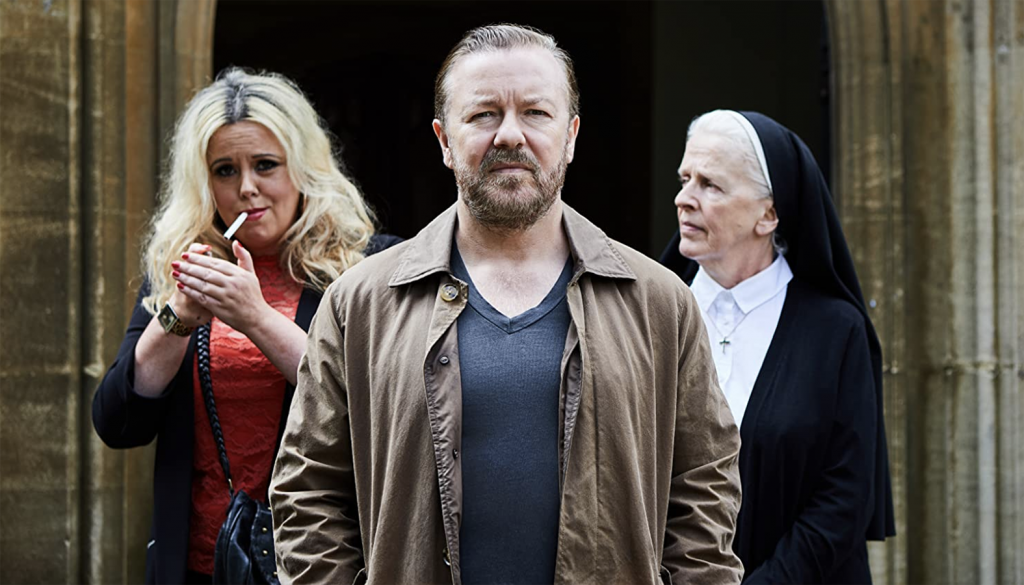I do kind of hate to admit it, but I really like British actor/comedian Ricky Gervais. I like him for his courage to go against all the prevailing winds, especially among the elites of his industry with whom, on first glance, you would think he would be in lockstep.
In many ways he is. I assure you he is perfectly fine with basic Hollywood insider dogma — abortion anytime, anyway, for any reason, marriage as a simple contract between two human beings regardless of genders or proclivities, and as dissoluble as a chocolate chip ice-cream cone on a sidewalk in August. And he harbors a severe distaste for, and mistrust of, anything that hints at metaphysical explanations for existence, and nurtures a manic refusal to accept any notion of a supreme being who is personally involved with his creatures.
And still I like him.
Maybe it was watching him make the comfortable squirm at those award shows, or his blasting that awful social media songfest of celebrities singing John Lennon’s “Imagine” with these big broad smiles. I’m sure some 89-year-old lying in his bed at the convalescent hospital, struggling for breath due to the coronavirus (COVID-19) infection was thrilled to hear Wonder Woman actress Gal Gadot singing about there being “no heaven.”
Gervais doesn’t believe there’s a heaven either, but he seemed to understand that celebrities singing that song, in that context, was too smug and self-satisfied to stomach.
I don’t think I’m going to hear about any deathbed conversions from Gervais, or ever see him on the “700 Club” with Kirk Cameron talking about his story of seeing a light after some near-death experience and professing Jesus is now and forevermore his own personal savior. It’s easier for me to picture Ricky Gervais as a guy who may have been standing on the last piece of dry land as he watched Noah’s ark sail by, and then jumping headfirst into the torrent and swimming downward with all his might in a final act of nihilistic self-determination.
I can fantasize that he may indeed have a conversion story in his future. There have been bigger sinners and bigger atheists than him who have made that journey. But all of that is way above my pay grade.
In Gervais’ most recent series “After Life,” he plays a character obsessed with two things: the darkest kind of depression imaginable and thoughts of suicide. Not exactly two topics one would put in their top 25 to base a half-hour comedy on, but that is Gervais’ unique gift. He can do that — he’s that good. When we meet his “After Life” character for the first time, he is in the throes of depression, because he has lost his wife to cancer. In every episode the wife makes an appearance via computer video and her joy and his joy in the videos makes his awful sadness all the heavier.
Because of Gervais’ pronounced atheism, the character he has created is not looking for meaning in his suffering over the loss of his one true love. He is seeking a way to either do away with feeling anything at all by committing suicide, or coming to some kind of cosmic nonaggression pact where he pushes past his pain and finds an accommodation between his elemental view that life is pointless with living as a social animal in the small town British social structure his character inhabits.
So why do I like this show so much? Maybe I’m seeing it through stained-glass colored spectacles, hoping there will be some kind of resolution to this character’s depression that I can live with as a believer in the afterlife.
Misanthrope that he is, and I think the actor and the part are pretty closely connected here, his character does try to be nice to people and he very much likes his fragile 10-year-old nephew and his dog, who is the living link between his character and his deceased wife. The fact he feels guilt over some of the people he treats badly and tries to make amends makes him appealing to me, even though, as an atheist, there is no rational reason why he should want to do that.
So, I’m left hoping that maybe the reason his character does want to connect with people in a more loving way is the same reason his character was so in love with his deceased wife.
And as cynical as the actor and character may be, love is about as metaphysical as it gets, and since you know who is love, maybe, just maybe, Gervais has more road to travel.

